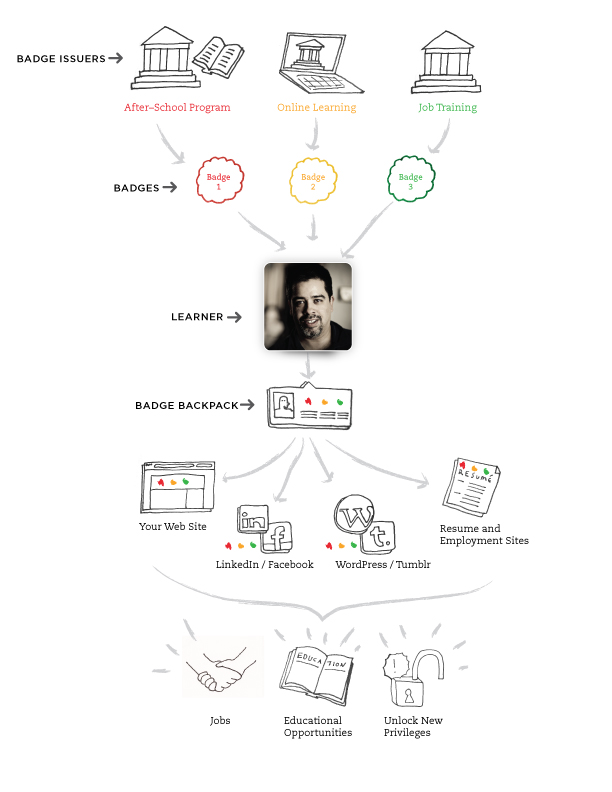This is a guest post from Erin Knight, who works with Mozilla and P2PU on assessment in open peer learning environments.
Let’s face it – learning looks very different today than traditionally imagined. Its not just ‘seat time’ within schools, but extends across multiple contexts, experiences and interactions. It is no longer just an isolated or individual concept, but is inclusive, social, informal, participatory, creative and lifelong. People are learning new skills like digital literacies and 21st Century Skills, as well as learning through new pathways and channels such as through open education opportunities from providers like P2PU, through freely accessible information repositories like Wikipedia and many other destinations on the Web, and through each other on social media and other collaborative tools. Much of this learning involves critical job-relevant competencies that include the obvious hard skills and professional development, but even further, and perhaps more importantly, social skills like collaboration, teamwork and critical thinking.
And yet, much of this learning does not ‘count.’ Institutions still decide what types of learning if officially recognized, with little room for innovation, as well as who gets to have access to that learning. Their end products, the grade or degree, are the only way that learning is currently communicated and recognized within the system, as well as the larger society. Without a way to capture, promote and transfer all of the learning that can occur (and is occurring) across the wider spectrum, we are discouraging self-driven engaged learning, making critical skills unattractive or inaccessible, isolating or ignoring quality efforts and interactions and ultimately, holding learners back from reaching their potential.
This is where we feel badges can come in. Badges are digital emblems or symbols of skills, achievements, interests or affiliations. Badges can be aligned with assessments, like those mentioned in the last post, to provide meaningful evidence of learning that can be carried with a learner to demonstrate their skills. Badges can support innovation in assessment and be awarded for a much deeper and wider set of skills and achievements, including the often neglected social skills like collaboration and teamwork, and thus one’s collection of badges can tell a much more comprehensive story to potential employers, formal institutions and peer communities.
Specifically, badges can support:
- Capturing and demonstrating the learning path
- Signaling achievement and ability to key stakeholders like recruiters or peers
- Motivating learning and participation
- Adapting to and supporting innovation in learning and assessment
- Formalizing and extending reputation and identity development
- Fostering community and kinship
I am involved in a number of initiatives to explore the potential for badges, including developing a badge and assessment program for P2PU, specifically in their School of Webcraft which is a partnership with Mozilla. This badge program will offer credentials for web developer training and will ultimately provide pathways for learners to not only find additional opportunities for learning and skill development, but to find jobs and get real results. In addition to working with P2PU, as well as a number of other badge issuers, we at Mozilla are also building the Open Badge Infrastructure which will support a badge ECOsystem, in which there are many badge issuers, and any given learner can earn badges across experiences, collect them to a single collection and then share them out with various websites and stakeholders. The OBI provides the plumbing to extend the value of each learning experience and each badge.
Again, the ultimate goal of all of all of this exploration and momentum around badges is to support learning as it occurs all across the Web, keep each learner in control of her own learning and credentials, and allow people to share that learning and evidence of skills and experiences with anyone, thus adding flexibility and value to the system and supporting personalized learning paths.
For more information on our work with badges, visit http://openbadges.org. Also, read more at http://bit.ly/badgepaper4 and http://erinknight.com

